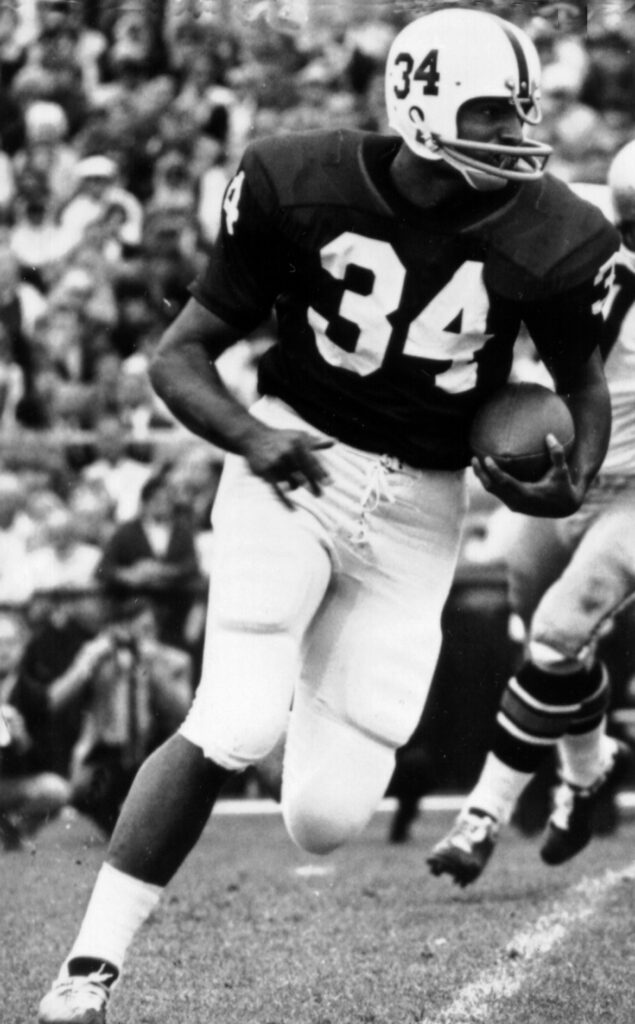Franco Harris was a popular Penn State graduate who went on to a Hall of Fame career as a running back for the Pittsburgh Steelers in the National Football League.
A native of Fort Dix, New Jersey, Harris was one of nine children born to Cad and Gina Harris. He was a standout football player in high school and recruited by Coach Joe Paterno to play for Penn State.
The Hotel and Restaurant Management major was a three-year letterman at Penn State as a fullback on the football team. During his career, Harris rushed for 2,002 yards and scored twenty-four touchdowns. However, he was known primarily a blocker for teammate Lydell Mitchell.

In 1972, Harris was drafted in the first round by the Pittsburgh Steelers. During his first season, he ran for 1,055 yards and scored twenty-four touchdowns, earning Rookie of the Year honors.
In all, Harris played twelve of his thirteen NFL seasons for the Steelers and became one of the team’s most beloved players. He was especially popular with the city’s Italian-American population, who became known as “Franco’s Italian Army,” a nod to his roots as the son of a Black father and an Italian mother.
Harris was best known for the “Immaculate Reception,” one of the most famous plays in NFL history. In a 1972 playoff game against the Oakland Raiders, the Steelers trailed 7-6 with 22 seconds left in the game. Pittsburgh quarterback Terry Bradshaw threw a desperation pass to a receiver that was deflected by a Raiders player. Harris caught the ball just before it hit the ground and ran 40 yards for the touchdown that won the game. It was Pittsburgh’s first playoff victory and a sportswriter dubbed it the “Immaculate Reception.”
During his career, Harris rushed for 12,120 yards and scored ninety-one touchdowns. He also caught 307 passes for 2,287 yards and nine touchdowns. He was selected for nine consecutive Pro Bowls between 1972 and 1980.
Harris helped lead the Steelers to four Super Bowl victories between 1974 and 1979. In 1975, he became the first Black player to win the Super Bowl Most Valuable Player Award.
Harris was an active supporter of various causes in the Pittsburgh community. In 1976, he was named the NFL Man of the Year as the league’s most outstanding “citizen-athlete.”
Harris played his final season with the Seattle Seahawks. He retired from professional football in 1985, holding or sharing twenty-four NFL records. Five years later, he was elected to the Pro Football Hall of Fame.
Harris went on to become owner and president of Super Bakery in Pittsburgh. He also served as chairman of “Pittsburgh Promise,” which provides scholarships to the city’s public school students.
Harris advocated on behalf of Penn State and the athletic department. During the Jerry Sandusky sexual abuse scandal, he was a vocal supporter of Paterno. He spoke on campus and attended protests. Harris argued that the university’s Board of Trustees was wrong in firing Paterno, arguing that the coach did not cover up Sandusky’s crimes.
Harris died on December 20, 2022, just three days before the Steelers planned to retire his No. 32 at halftime of a game. He was 72.
Anna Ludwig
Sources:
Pennsylvania Center for the Book. https://pabook.libraries.psu.edu/literary-cultural-heritage-map-pa/bios/Harris Franco (Accessed October 25, 2023).
“Franco Harris,” Pro Football Hall of Fame, https://www.profootballhof.com/news/2009/12/news-franco-harris-class-of-1990 (Accessed October 25, 2023).
“Franco Harris, Steeler who caught Immaculate Reception, dies,” AP News, December 21, 2022.
First Published: November 27, 2023
Last Modified: February 28, 2024
